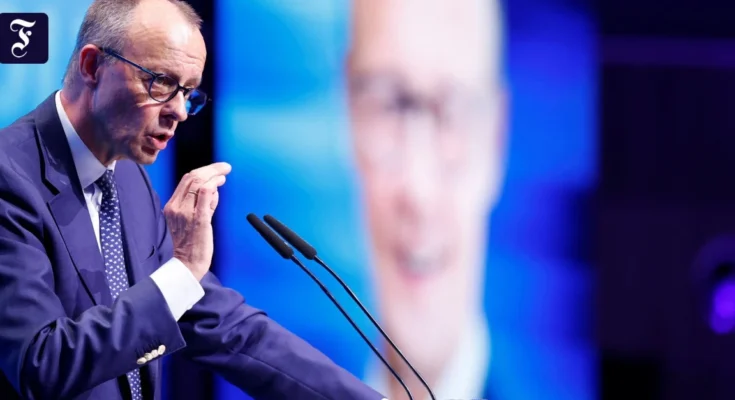When Friedrich Merz entered the stage, the song “High Hopes” came from the speakers. They had high hopes for him at Junge Union. And on Germany Day at Europa Park in Rust, Baden-Württemberg, the young Christian Democrats wanted to remind the CDU chairman of this.
Merz, who was a member of the Junge Union half a century ago, is now 70 years old, promising suitable policies for his grandson as Chancellor. But Junge Union wonders how serious he is, as they are dissatisfied with the federal government’s pension package. So the atmosphere, at least at one point in the theme park, wasn’t very pleasant.
At least the reception on Saturday morning was friendly. But it wasn’t like last year, when Merz was cheered on in Halle. At that time he was still a candidate for chancellor and a bearer of hope – and a projection screen for young conservatives. “Oh, how beautiful this is,” they sang at the time. And holding up posters like “More Sauerland for Germany”. The chairman of the Junge Union, Johannes Winkel, recalled this in his speech at the start of Germany Day on Friday evening. The youth organization has supported Merz for years and “froze and burned” Merz during the election campaign, Winkel said. “Without JU, the CDU would not have won the 2025 federal election! Without Junge Union, Friedrich Merz would not have become party chairman and certainly not chancellor.”
Merz sent a “heartfelt request” to the delegates
Merz acknowledged these efforts in his speech. After about 25 minutes, he then addressed the topic of most concern to young delegates this weekend: pension policy. “We struggled very hard to answer these questions,” Merz said. The younger generation should not bear the blame for the mistakes of the older generation. But there will be a cap on pension levels until 2031. “That is a concession for the Social Democratic Party,” Merz admitted.
The day before, Winkel, also a member of the Bundestag, once again rejected the draft law that had been approved by the cabinet: “This pension package should not happen under any circumstances! The arguments are clear. The facts are clear. The judgment is clear.”
The bill from the SPD-led Labor Ministry proposes to stabilize the pension rate at 48 percent by 2031 and increase the so-called mother’s pension – a concern for the CSU. The Youth Group in the Bundestag also opposed the pension package. This includes 18 MPs who will be no older than 35 at the time of the federal election in February. Since the CDU, CSU and SPD only have a twelve-vote majority in the Bundestag, the young members of the CDU can cancel the retirement package. The allegation: The pension package incurred further costs of 120 billion euros. This is a “heavy burden” for the younger generation.
Merz discussed this in his speech. The Junge Union must engage constructively, but not take part in “undermining competition”. The question is not who offers the lowest pension rate. It was his “sincere request.” Murmurs sounded in the hall. Merz then said that all pension funding provisions needed to be put on a new foundation and private funding provisions needed to be strengthened.
About forty minutes later, the CDU chairman ended his speech. “Now comes the interesting part,” said a delegate with a smile. Discussion with Merz was on the agenda.
Chancellor: Also consider the interests of seniors
A young delegate from Bremen asked Merz if he shared the views of the Young Group on pension policy. The audience stood, cheering and clapping. Merz repeated his statement: The holding line is valid until 2031. The agreement with the SPD is clear.
Another delegate praised the Chancellor for his foreign policy: “We are again someone in the world,” he said. However, he did not like the reporting in the newspaper “Bild”. The delegation wanted to know from the Chancellor whether Merz had, as the newspaper reported, canceled the “rebel pension” for Labor Minister Bärbel Bas. Did Merz even switch sides? Is he abandoning the young group in the Bundestag or the entire young generation? No, Merz answered firmly: “We will not let the Youth Group fall! We will not let anyone fall.”
Finally, a delegate asked if Merz could agree to a retirement package “personally.” Merz said: “I will agree to the retirement package with a clear conscience.” This, said Merz, was the beginning and not the end of a debate. Changes to the social security system require preparation time. Merz, he said, did not want to take part in “undermining competition” in terms of pension rates. “You can’t be serious,” he said. The Union must maintain a majority. The job of the Federal Chancellor and party leaders is to balance interests. Merz said he would also visit senior unions and he would also have to consider their interests.
“I’m happy to be here”
A delegate from North Rhine-Westphalia spoke up and said that one should not “beat around the bush”. He always chooses Merz because he trusts him. He also wished the coalition success. But he also wanted to know: “Are you on the Junge Union side?” Merz confirmed: “Yes.” Then Merz, he said, responded openly to the dissent: “Do we assume 48 percent of 2031 or 47 percent?” he asked. “From then on, we will recalculate,” Merz said.
That same morning, Vice-Chancellor Lars Klingbeil promised his colleagues at the SPD state party conference in Ulm regarding the pension package: “I say clearly: Nothing will be changed in this law.” A delegate from the Junge Union in Rust noticed this and spoke to the Chancellor about it. He should remind Klingbeil of the Chancellor’s authority to direct policy.
The Chancellor’s debate also ended after about 40 minutes. Merz said goodbye while thanking: “I’m happy to be here.”
The state chairman of the Baden-Württemberg Junge Union, Florian Hummel, did not share in the fun. “The expectations of the delegates were very high, but I am sure the disappointment was clear to see. In my opinion, the Chancellor was not able to fully meet these expectations,” he told FAZ



